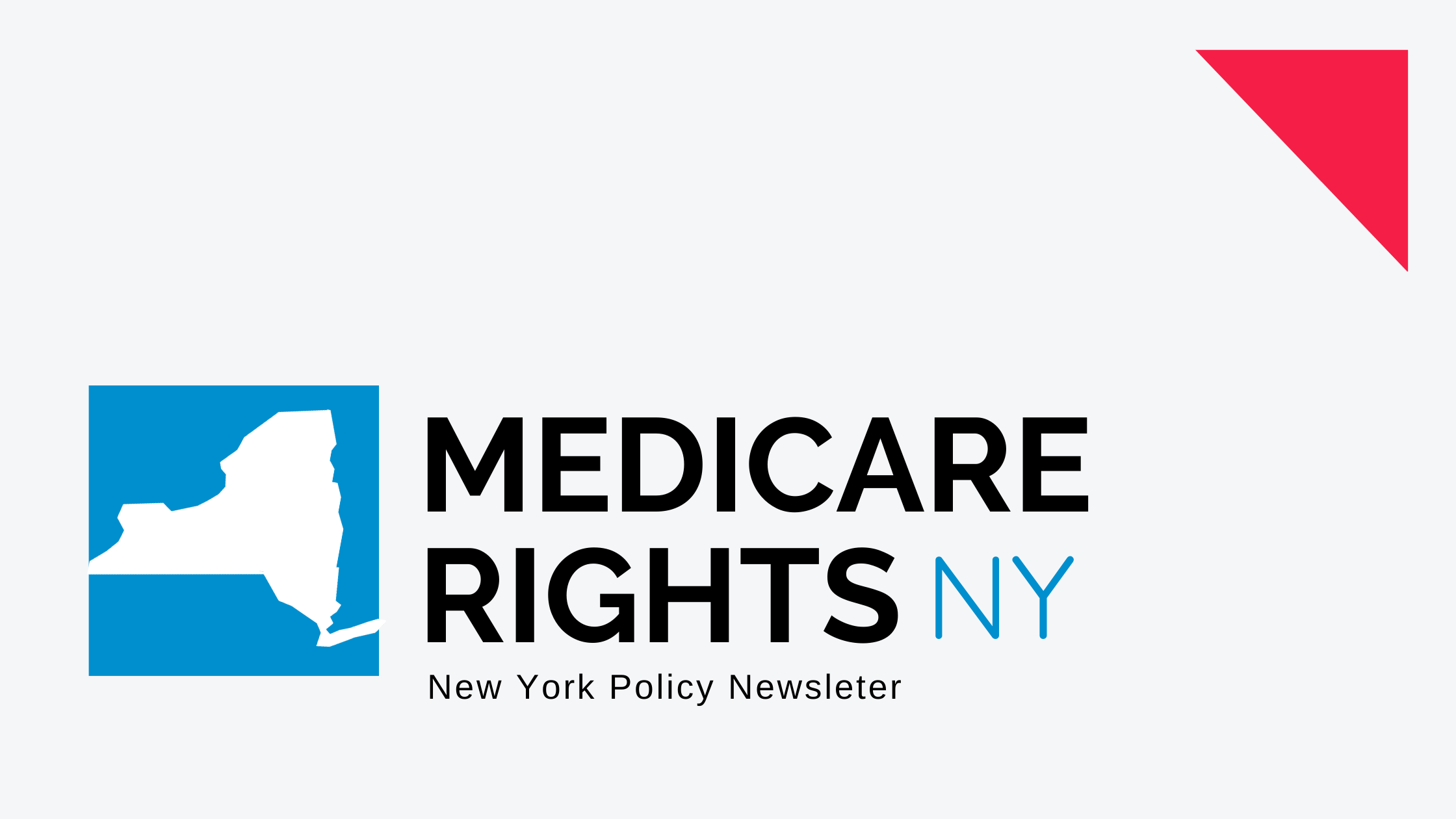Join Us Live for a Discussion on Medicare, Democracy, and the Future of Health Care

Medicare Rights Advocacy
New resource provides information on default enrollment in New York State
Medicare Rights has released a new flier related to default enrollment of dually eligible New Yorkers into integrated Medicare-Medicaid managed care plans. The flier defines default enrollment, provides a case example for how default enrollment works, and reviews notice requirements. It also explains continuity of care rights for individuals who are default enrolled and lists plans in New York that are currently approved to use default enrollment.
To learn more about coverage options for dually eligible New Yorkers, please visit our Medicare Interactive toolkit.
Upcoming Medicare Rights webinar on default enrollment and integrated care options for dually eligible New Yorkers
On April 14, Medicare Rights will host a webinar to educate New York professionals on default enrollment. Medicare Rights staff will review coverage options for dually eligible individuals, including Dual-eligible Special Needs Plans (D-SNPs) and Medicaid Advantage Plus (MAP), and discuss how default enrollment may affect soon-to-be Medicare-eligible individuals enrolled in a Medicaid Managed Care (MMC) plan or Health and Recovery Plan (HARP). The webinar will also review other important topics for advocates who serve duals, including continuity of care rights and options for changing coverage. There will also be an opportunity for Q&A.
Interested individuals can register here.
Governor Cuomo releases New York State budget
Governor Cuomo recently released the 2021 NYS Executive Budget. Medicare Rights is pleased to report that the Managed Care Consumer Assistance Program (MCCAP) and the Community Health Advocates (CHA) program received level funding. Medicare Rights also supports the proposal to strengthen the Essential Plan. By eliminating premiums for this plan, an estimated 100,000 additional New Yorkers may enroll in coverage.
Medicare Rights is concerned that this year’s budget makes no investment in community-based long-term services and supports. In fact, it makes additional cuts to home care workforce recruitment and retention funding at a time when more home care aides and attendants are needed than ever before. Medicare Rights is advocating that the final budget better promote community-based services by adequately funding the home care workforce to provide for people’s needs.
See Medicare Rights’ budget testimony here.
New York State and Federal Government Updates
Medicare changes continue to help combat COVID-19
The COVID-19 public health emergency (PHE) has sparked a host of major changes to the Medicare program, including wider availability of telemedicine, greater access to medications, and flexibilities designed to decrease burdens and improve staffing for providers. Looking forward, there are still areas of need, both during and after the PHE, to ensure that people with Medicare have access to the coverage and care they rely on to keep them safe and healthy.
One of the primary needs is for individuals to be enrolled in the Medicare coverage for which they are eligible. Early in the PHE, some enrollment flexibilities allowed people to enroll in and change their Medicare coverage at different times, but these flexibilities have lapsed Ensuring that people have access to care is vital, especially during a pandemic, and we will continue to urge Congress and the Biden administration to close this important gap.
For more information about Medicare changes during the PHE, please visit Medicare Rights’ blog.
Medicare Rights testifies on future of telehealth
On March 2, Medicare Rights Center President Fred Riccardi testified at a hearing of the House Committee on Energy & Commerce, Subcommittee on Health entitled, “The Future of Telehealth: How COVID-19 is Changing the Delivery of Virtual Care.”
While Medicare Rights applauds many of the changes adopted during the pandemic to help beneficiaries obtain needed services, much is still unknown about the impact of these sudden changes on beneficiaries and the program. Amid calls to make all of the public health emergency telehealth changes permanent, Mr. Riccardi urged a more thoughtful approach.
“We recognize the rapid shift to telehealth has led to pushes for rapid policymaking. We agree that modernizations are needed, but so is restraint. As you consider the future of [Medicare telehealth] coverage, we respectfully ask you to move forward deliberately and collaboratively, collecting and following the data, and prioritizing beneficiary needs and preferences.
For more information or to read the full testimony, please visit Medicare Rights’ blog.
Show Comments
We welcome thoughtful, respectful discussion on our website. To maintain a safe and constructive environment, comments that include profanity or violent, threatening language will be hidden. We may ban commentors who repeatedly cross these guidelines.
Help Us Protect & Strengthen Medicare
Donate today and make a lasting impact
More than 67 million people rely on Medicare—but many still face barriers to the care they need. With your support, we provide free, unbiased help to people navigating Medicare and work across the country with federal and state advocates to protect Medicare’s future and address the needs of those it serves.
The Latest
Most Read
Add Medicare to Your Inbox
Sign up to receive Medicare news, policy developments, and other useful updates from the Medicare Rights.
View this profile on InstagramMedicare Rights Center (@medicarerights) • Instagram photos and videos









